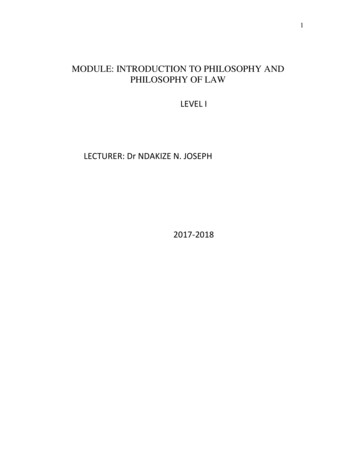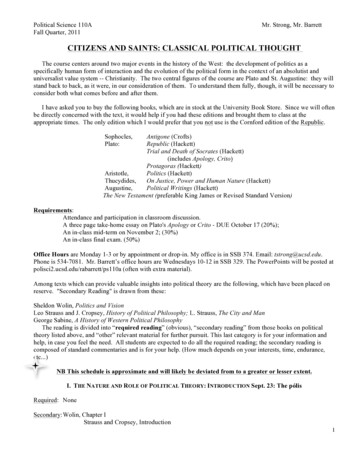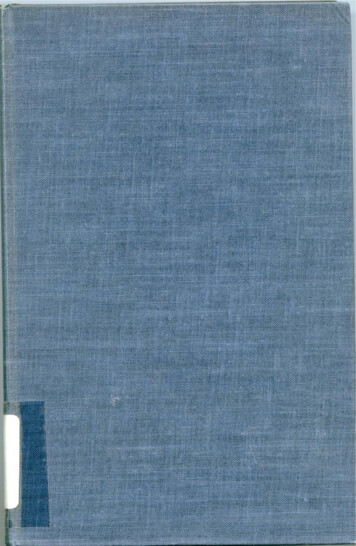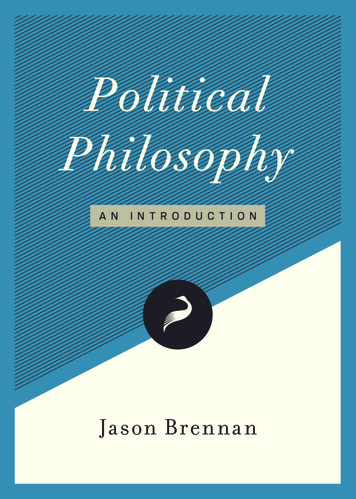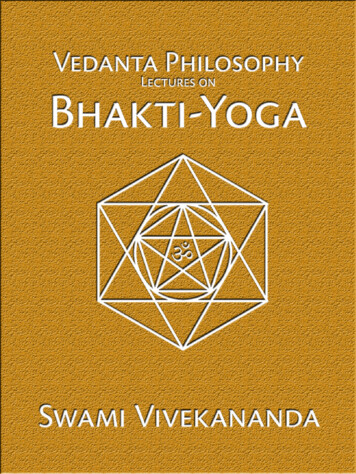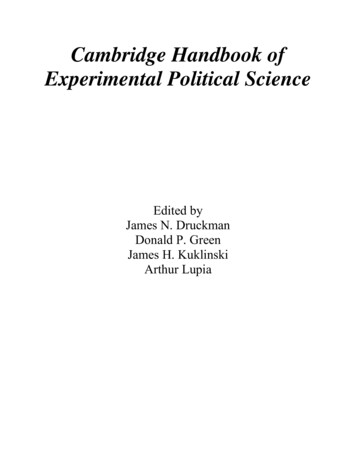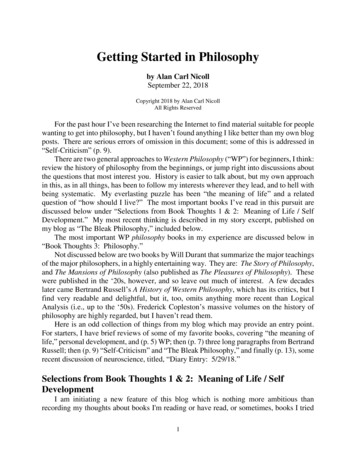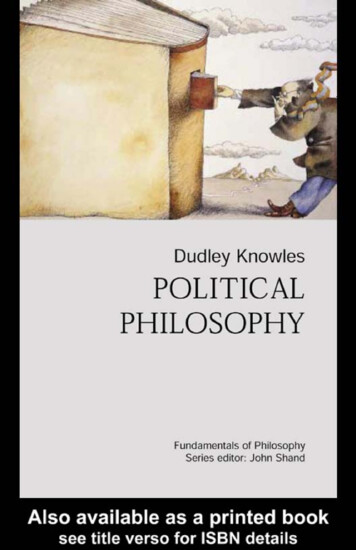
Transcription
Political PhilosophyPolitical Philosophy is a comprehensive introduction to the majorthinkers and topics in political philosophy. It explores thephilosophical traditions which have formed and continue toinform our political judgements. Dudley Knowles introduces theideas of key political thinkers including Hobbes, Locke, Marx andMill and influential contemporary thinkers such as Berlin, Rawlsand Nozick.The individual chapters discuss and analyse the ideas of utilitarianism, liberty, rights, justice, obligation and democracy. Aswell as outlining central problems in political philosophy, Knowlesencourages the reader to critically engage with all the issuesdiscussed.Political Philosophy is written in a fresh and easily readablestyle and is ideally suited to students taking introductory coursesin political theory and philosophy as well as the general reader.Dudley Knowles is Senior Lecturer in Philosophy at the University of Glasgow. He is the author of the Routledge PhilosophyGuideBook to Hegel and the Philosophy of Right.
Fundamentals of PhilosophySeries Editor: John ShandThis series presents an up-to-date set of engrossing, accurate andlively introductions to all the core areas of philosophy. Each volume is written by an enthusiastic and knowledgeable teacher ofthe area in question. Care has been taken to produce works thatwhile even-handed are not mere bland expositions, and as such areoriginal pieces of philosophy in their own right. The reader shouldnot only be well informed by the series, but also experience theintellectual excitement of being engaged in philosophical debateitself. The volumes serve as an essential basis for the undergradutecourses to which they relate, as well as being accessible andabsorbing for the general reader. Together they comprise anindispensable library of living philosophy.Published:Dudley KnowlesPolitical PhilosophyPiers BennEthicsAlexander BirdPhilosophy of ScienceStephen Burwood, Paul Gilbert and Kathleen LennonPhilosophy of MindColin LyasAestheticsAlexander MillerPhilosophy of LanguageForthcoming:Richard FrancksModern PhilosophyGreg RestallLogicSuzanne Stern-GilletAncient PhilosophySimon GlendinningContinental Philosophy
Political PhilosophyDudley KnowlesLondon
First published 2001by Routledge11 New Fetter Lane, London EC4P 4EERoutledge is an imprint of the Taylor & Francis GroupThis edition published in the Taylor & Francis e-Library, 2001. 2001 Dudley KnowlesAll rights reserved. No part of this book may be reprinted orreproduced or utilised in any form or by any electronic,mechanical, or other means, now known or hereafter invented,including photocopying and recording, or in any informationstorage or retrieval system, without permission in writing fromthe publishers.British Library Cataloguing in Publication DataA catalogue record for this book is available from the BritishLibraryISBN 1–85728–760–6 (hbk)ISBN 1–85728–550–6 (pbk)ISBN 0-203-18788-1 Master e-book ISBNISBN 0-203-18911-6 (Glassbook Format)
To my mother, Margaret Knowles, and, in memoriam, GRK, DAK,AK, KC and EJC
ContentsPreface1IntroductionThe methods of ethics and political philosophyA methodological impasse?Reflective equilibriumxi1339Political philosophy14223UtilitarianismThe foundations of utilitarianismFormal theoryValue theory242538Utilitarian political philosophyLibertyRightsDistributive justiceThe 9vii
CONTENTSLiberty, liberalism, libertarianismAnalysisIsaiah Berlin: negative and positive libertyThe republican theory of freedom70717485The value of freedomFreedom of actionAutonomyMoral freedomToleration88909298100Free states and free citizensDemocratic freedomCivil libertyMill’s harm principleSupplementary troduction133Analysis and definitionPreliminariesHohfeld’s classification135135138The justification of rightsLockean themes: modes of ownershipAutonomy againRights and interestsRights and utilityThe no-theory theory1551551591651691745177Distributive justiceEntitlementNozick’s theory of entitlementF.A. HayekPrivate property178179188192Human needs195viii
CONTENTSEquality of what?206John Rawls’s theory of justiceJustice as fairnessThe Original PositionThe principles of justiceDesertThe communitarian challenge2152152202252322356239Political obligationThe problems239Anarchism and communitarianism248Consent and contractOriginal contractsExpress consentTacit consentQuasi-consentHypothetical consent and hypothetical contract260263264266271276The benefits of good governmentThe principle of fairnessGratitude and good duction299Rousseau: freedom, equality and the general will302Direct and representative democracy311Democracy and majority tyranny319Democracy, deliberation and disagreement326Notes343Bibliography375Index387ix
PrefacePolitical philosophy is a hard subject of study, but an attractiveone, too. It is hard because the central concepts have been fashioned as much in the hurly-burly of political dispute as in thephilosopher’s study. These concepts have served as flags aroundwhich contending causes have rallied, banners for which opposingparties have fought – too often literally. Unlike many of the topicsof metaphysics, say, they always have a resonance for issues ofactive controversy. They are the recognized currency of politicalargument and debate. This immersion in our practical concernsmight be thought to contaminate the discipline, ensuring that nowork in political philosophy is without the taint of allegiance. Butthis would be to suppose that there is a pristine science of politicalconcepts waiting to be unearthed from the debris of interminableconflict, that the concepts can be scrubbed down and examinedfree of the scrapes and bruises inflicted by their rhetoricalemployment. There is no such science; there is no ‘first philosophy’of political life. Yet it is vital that political philosophy be a carefulacademic discipline precisely because it is never merely that. It isvital that it be as scrupulous and transparent as its maker canmanage because it will always be taken to be a contribution tostruggles for power and campaigns for policies.This makes it hard to do well. No one with a passion for politicalideas can be detached from the circumstances of their employment. Political philosophy is attractive because it promises a deepunderstanding of the values at stake in daily strife, it promises axi
PREFACEdefence of causes that are dear to us. But careful thought mayreveal that the defences are flimsy or that the values are confused.Most political philosophers will have a political agenda whichgoverns their personal contribution to public affairs, and no doubtyou will have worked out elements of mine by the time you finishthis book. But philosophy is an open-minded discipline, so, paradoxically, personal commitments must be regarded as provisional,having no more credibility than is conferred on them by thestrength of their supporting arguments.I am particularly conscious of this since I have to report that myphilosophical position has changed during the course of writingthis book. When I began it, too long ago, I believed that the basicprinciples of liberal democracy should find universal acceptance.The grounding beliefs, that mankind is born free and equal,seemed to me to be basic elements of a common culture that haveanchored themselves in the mind-sets of modern men and women.We think of ourselves in this fashion, willy-nilly. These are theguiding principles history has bequeathed us. So I didn’t think ofliberalism as a radical point of view. I thought of it as mother’smilk to the political sentiments of all good citizens. I believed, inthe modern world, that the true conservative who is respectful ofthe traditions of thought that have formed us and our politicalenvironment, would be a liberal at least in the sense of acceptingsome story about universal freedom and equality, and distrustfulof claims to authority. Of course, I recognized that values asloosely conceived as these require clarification and analysis, thattensions and confusions would be revealed as the grounding intuitions were worked up into principles and theories of a specificitythat could bear examination and assessment. But I didn’t doubtthat some cogent articulation of these values was the prospectusof philosophers and thoughtful citizens alike.What I had ignored was the dire effects of religious belief, inparticular the power of religion to corrode sentiments as crucialto peaceful social co-existence as mutual respect and relaxed tolerance. The most noxious human capacities, agression, hatred andcruelty, seem to coagulate around religious beliefs which advertisetheir necessary distinctiveness, and then are transmuted intocommunal militancy. As the hatreds expressive of conflictsbetween political ideologies seem to have dried up, militantxii
PREFACEreligion has stepped into the breach and now fuels murderousinternecine conflicts worldwide – last year the former Yugoslavia,last month Indonesia, this week Nigeria. Doctors are murderedoutside abortion clinics in the USA, and shoppers are blown up inOmagh. Hegel makes us shiver when he describes the mentality ofthe Terror in Revolutionary France as death, ‘the coldest andmeanest of all deaths, with no more significance than cutting off ahead of cabbage’.1 Rarely does a week go by nowadays without ourseeing some TV footage of bodies piled into trenches, disposed ofin the manner of waste vegetables.So now I am a partisan, even militant, liberal. I despair of theprospect of finding common ground with those whose religiousbeliefs prescind from civility, from the task of seeking, minimally, amodus vivendi or, maximally, substantial agreement. I no longersee the sole task of political philosophy as the Hegelian enterpriseof exploring and refashioning a consensus. Nowadays, we have togive as much attention to the dire task of drawing lines in the sand,marking off values which we recognize that only some of our fellows deem worthy of defence, values that are all the more crucialfor being seemingly parochial.When my efforts are set against this agenda, I don’t claim to haveaccomplished much. On reflection, rarely do I reach definitive conclusions. What I do hope is to have placed some intellectualresources at the disposal of openly enquiring minds, raising questions, drafting lines of argument, provoking the kind of disagreement that challenges the reader to respond. I have concentrated onwhat I believe are the central areas of investigation. Though I amno card-carrying utilitarian, I examine the utilitarian theory indetail because I believe it is the most powerful, sophisticated andinfluential normative theory which is available to us, for better orworse. Next, I examine the core ideals of liberty, rights and justicein the distribution of goods. Next, I study the problem of politicalobligation, asking whether the state can make good its claim torightful authority over its citizens. Finally, I look at constitutionalissues, investigating the ethical credentials of democracy.This self-directed focus has made it impossible for me to discussmany issues in political philosophy which have a direct bearingon practical and often urgent policy issues. So I don’t discussseparately the politics of race, the particular injustice of racialxiii
PREFACEdiscrimination or the legitimacy of affirmative action or reversediscrimination. I don’t discuss justice between the sexes or thefeminist contribution to political philosophy. I don’t discuss theacceptability of nationalism, the ethical implications of multiculturalism, or the proper conduct of international relations,except by way of example when other issues are in focus. I regretall of these omissions, but hope that those who are encouraged totackle the questions I haven’t raised may find in the book materialsto help them in their efforts.It is impossible to complete a work of this sort without accumulating debts. Some of them are acknowledged in the text, someunfortunately not. The bibliography furnishes a partial guide tomy reading, but I should record the books I have had alongsidemy desk throughout the period of composition. Unsurprisinglyperhaps, these have been Hobbes’s Leviathan, Locke’s SecondTreatise, Hume’s Treatise, Second Enquiry and Essays, Rousseau’sDiscourse on the Origins of Inequality and Social Contract, Hegel’sPhilosophy of Right, J.S. Mill’s Utilitarianism and On Liberty,Rawls’s Theory of Justice. Temperamentally, I don’t seem to makemuch progress in political philosophy without first stepping backand studying what these giants of the discipline have to say.My acknowledgement of personal debts must also be patchy.Students can always be relied upon to prompt their teachers intorethinking positions which would otherwise solidify into nostrums. Colleagues who, after reading students’ work or listening tothem in tutorials, stop me in the corridor and ask ‘Do you tell themthat ?’, have similar effects – collapse of stout party and back to thedrawing-board. Over the years, bits of this material have been readto philosophers in Glasgow and other universities, and I have welcomed and sometimes used their comments. Nick Zangwill readsome of the manuscript material and I benefited from his advice.John Shand read early versions of the first five chapters, correcting errors and helping me clarify obscure material. Pat Shaw hasread just about all of it; his criticisms, advice and encouragementhave been invaluable. I am a duffer with a word processor and allthings IT. My neighbours on the top floor of the philosophydepartment in Glasgow, Angus McKay and Susan Stuart, haveresponded kindly and patiently to my pathetic, panicky, pleas forassistance. John Shand, the series editor, and Tony Bruce andxiv
PREFACEMuna Khogali at Routledge, have been helpful and accommodating in the face of my prevarications and the anonymous refereesthey have recruited have improved the final version.Since I expect that this book will be used largely for teaching, itis appropriate that I thank my teachers of political philosophy. Iwas first introduced to the subject at Kirkham Grammar School byBernard Coates. There was no National Curriculum and politicalphilosophy was certainly not on the examination syllabus, butBernard thought it would be interesting for us to discuss the contract theories of Hobbes and Locke, so we did. I was so excited Iimmediately took the only valuable book in the house, a beautiful,many-volume work on The Horse: Its Treatment in Health and Disease, and swapped it for a tatty copy of Sabine’s History of PoliticalThought. I suspect the booksellers, Messrs Halewood, of Friargate, Preston, are still laughing. This initial interest was rekindledin London, when I found myself preparing abstracts of materialdirected to questions my brother had spotted for his final exams atthe LSE, but unfortunately had not had any time to study. It wasfostered at Bedford College, London, by David Lloyd-Thomas, whohad the wonderful, generous gift of finding good and interestingideas in the most hurried and turgid essays I presented to him. Myinterests were further encouraged by Robin Downie when I cameto Glasgow. It’s a pleasure to acknowledge my debts to all of themand express my gratitude.My wife, Anne, has had a lot to suffer in the preparation of thisbook. Mercifully she takes no interest at all in its contents, nothaving a philosophical bone in her body – so I thank her for theblessed relief.xv
Chapter 1IntroductionYoung children, we understand, are born philosophers. They askexasperated parents such deep questions as ‘Where is my mind?’ or‘Is Granny living with all the other dead people in the churchyard?’. The spirit for philosophy which is born out of naïveté issoon extinguished, so the taste for philosophical reflection has tobe rediscovered. I conjecture that it is an acquired taste, promptedby some strange contingency. Who knows the story behind yourpicking up this book? Still, some brands of philosophical enquiryare more likely to be prompted than others. An adolescent whofound himself pondering the nature of numbers would be a splendid eccentric. By contrast, youthful rebellion can be relied upon tokindle low-level philosophical musings about the rules ofbehaviour. If parents say such and such is the right thing to do andthe teenager insists that he does no wrong in not doing it, theconflict of views is likely to raise all sorts of philosophical questions: What is the nature and extent of parents’ authority? Whatsort of respect is required for their rules? They can enforce theirdemands and prudence may dictate compliance, but does that1
INTRODUCTIONmake it right? If the question of who decides what behaviour isacceptable and what is not seems up for grabs, the question of howto decide will surely follow. Is it a matter of choice or preference orpersonal belief ? And so on.Such questions (and many more) comprise the subject of ethics,and I suspect that most people dip their toes into the water in theminimal sense of recognizing that there are questions to beanswered, issues to be debated. Political life has the same character of putting philosophical questions up front. Authoritarianregimes prompt the same reflections as authoritarian parents.Democratic regimes conduct debates about competing policies interms of the values such policies embody. Liberty may be opposedto justice. The public interest may require the sacrifice of persons’rights. This is the diet of editorials in tabloids as well as the broadsheet newspapers. Questions of ethics and political philosophy areubiquitous, in the very air we breathe. The surprise for many isthat the problems are not novel, that there is a rich history ofcareful deliberation about them, that the questions which seemfresh in 2000 have often been recorded as debated for the lasttwo and a half millenia.We are heirs to this rich tradition of philosophical dispute.Though philosophical problems seemingly spring up afresh eachday like mushrooms, similar problems have been worrying folks foras long as intellectual problems have been recorded. When we takeseriously the philosophical questions posed directly in politicallife, we encounter immediately a vast literature organized aroundthe problems mankind has encountered, the philosophers whohave contributed to their solution and the theories that have beenrecurrently proposed as the means of tackling them.The prospect can appear dismal. You ask: Do I have an obligation to obey the law? and one of nature’s teachers gives you areading-list – as they say, from Plato to NATO. In truth, this shouldbe a source of excitement, since the history of philosophy does notparade itself as a progressive discipline in the manner of the history of science. You can learn from the Ancient Greeks, not leastbecause the present is a small parish inhibited by parochial concerns. Escape into past ways of thinking, in philosophy if not inphysics, can be a liberation. What a marvel it is to read Plato’sreport in the Republic of Socrates working out why might is not2
INTRODUCTIONright, or Hobbes at the time of the English Civil War describinganarchy and arguing for the necessity of an absolute orunrestricted sovereign power. These are people you will want toargue with and you will find, to your pleasure, that it can be hardto do so.Everyone who studies political philosophy has to know something about the history of the subject because that history is apriceless resource as much as it is an antiquarian interest. But thisbook will not address this history directly. Rather we shall concentrate on the central questions of political philosophy and the leading theories that have been employed to answer them. For themoment, I want to examine the methodology of political philosophy, to say a little more about the relationship of theory tojudgement in the sphere of ethics – of which political philosophyis evidently a part.The methods of ethics and political philosophyA methodological impasse?Let’s begin our reflections with a hackneyed example. Suppose wehave a sheriff who, along with utilitarian thinkers, believes theright action is the one that produces the greatest human welfare.Faced with a rioting mob, he decides a scapegoat is required toprevent widespread harm. He selects a plausible (but innocent)culprit for punishment and calm is restored. Harm and injustice isdone to the poor innocent – but the greater evil is averted. Theutilitarian sheriff defends his action as the right thing to do in thecircumstances. A critic objects. The sheriff’s action was wrongbecause it was unjust. No amount of benefit to any number ofthird parties can vindicate the punishment of an innocent man orwoman. That principle is inviolable.How are we to adjudicate the issue? On the side of the sheriff,supposing all the facts of the case are right, is a deep and plausiblemoral theory. The pity is that this theory of what constitutes rightaction commits him to doing what would normally be judged awrong action. On the side of the critic is the principle (‘intuition’is the term often used here) that it is unjust, and therefore wrong,3
INTRODUCTIONto punish the innocent. The sheriff has a theory, which he candefend if pressed, which enables him to judge what is right intricky cases like this. She (the critic) thinks that his theory isindefensible if it justifies him acting in a way that violates herprinciple. So – do we keep the theory and sacrifice the principle ordo we jettison the theory because we cannot find it in us to rejectthe principle?This question, often posed in the discussion of utilitarianism, is,at bottom a dispute about methodology. There are many ways forward and all of them are controversial since philosophical disputereaches into the methods of ethical and political theory as well asthe diet of problems which give rise to speculation about theappropriate method for tackling them. First, we need to understand the notion of a theory as the sheriff is employing it. The first,simplest, conception takes the theory to be a systematization ofthe moral and political judgements we are inclined to make. Wefind ourselves judging that this action is right, that action wrong,that this system is fair, that unjust. And we accord these judgements considerable status. They are not self-evident or absolutelyunrevisable, but we are more likely to stick to them than we are toaccept a theory which is inconsistent with them. We recognize thatwe operate with a great and complex stack of moral principles andreflection suggests that such judgements are the product of adeeper principle – in the case of the sheriff, the utilitarian viewthat actions and practices are right if they maximize well-being.We have explained the judgements we reach, but this explanationmay serve wider purposes. It may guide us when we find ourselvesin a difficult dilemma. In entirely novel circumstances, of the sortthat medical advances seem to throw up daily, the theory may showus the way forward. Obviously, this conception of moral theorycannot help us if we review the above example. The sheriff and hiscritic differ precisely on whether the case represents a decisiveexample which should cause us to reject or qualify the theory.Since both agree that what is decisive is the authority of the particular moral judgement or rule, I shall dub this view‘particularist’.1A different conception of moral theory regards the task ofthe theorist very differently. On this account, the task of moraltheory is to validate or generate moral principles, to serve as a4
INTRODUCTIONfoundation for them. Utilitarianism may be viewed in this light,too, since, as we shall see, its techniques may be employed to assessnot just specific actions and practices, but moral rules as well. Ifthis is right, if some such theory finds conviction, whether it isutilitarianism, Kantian formalism which uses the test of thecategorical imperative, contractualism or the theory of DivineCommand, it follows that our intuitions regarding subordinateprinciples are all revisable in light of the theory to hand. Possession of such a theory would settle the dilemma posed by thesheriff’s actions and the critic’s challenge. We can dub this notionof theory ‘foundationalist’ – again with warnings about incautioususe of the terminology. Unfortunately, I have no such theory tohand, believing that all attempts to delineate such an ambitousproject have failed.We have two different conceptions of moral theory and two different accounts of the status and revisability of the moral judgements and principles that such theories (in their different ways)encompass. It is worth noticing that these disputes about thenature of normative ethics find an echo in deep disputes about theappropriate methods of political philosophy. Hegel noticed thatmodern subjects claim what he described as ‘the right of the subjective will’, a distinctively modern attitude which claims ‘thatwhatever it is to recognize as valid should be perceived by it asgood ’. (Alternatively: ‘The right to recognize nothing that I do notperceive as rational is the highest right of the subject.’)2 Thisstance may be dubbed ‘individualist’ or even ‘liberal’. It echoesKant’s claim that ‘Our age is the genuine age of criticism, to whicheverything must submit’.3 In this context, the thought is that theindividual who seeks the credentials of principles or institutionshas detached himself from their moral ‘pull’ in order to conducthis investigation. He has placed himself above the mêlée, abstracting from all prejudice and allegiance in order to carry out a judicious review of what theory (in the guise of reason) requires. Suppose I find myself questioning the obligations I hitherto felt to aparent or a child. I see others behaving differently and wonder ifperhaps I can legitimately do the same. It looks as though the onlyway I can examine these questions is by stepping outside of theinstitutions of domesticity and subjecting them to an externalassessment. Or suppose I find myself breaking the law with5
INTRODUCTIONimpunity and no sense of guilt – buying my under-age child a glassof cider in a country pub. Being philosophical, this causes me towonder whether I have a general obligation to obey the law. Again,once prompted, once the question has been asked, I find myself at adistance from the press of what hitherto I had taken to be an obligation. Detaching myself from the moral force of the institutionsthat bind me by their rules, I can pursue my investigation as anoutsider would. Should I subscribe to this general rule or shouldI modify or reject it in the light of the best reasoning I cancommand, the best theory at my disposal?In the seventeenth century, for a variety of reasons, philosophers who reflected on politics began to question the grounds oftheir allegiance and the legitimacy of the constitutions of particular states. From what stance could this appraisal be conducted? Itseemed obvious to some that the best way to answer the question ofwhether or not they had good reason to obey a sovereign power wasto hypothesize that they had none – and then ask whether rationalagents with a specific set of wants (Hobbes) or wants and values(Locke) would have good reason to establish one. They deducedthat those without a sovereign power (as they said, in a State ofNature) would recognize that a sovereign ought to be instituted;those who found themselves already subject to the claims of sovereign authority should recognize it as legitimate. The reasoningwhich generated these conclusions could be advanced by (orexpained to) each sceptical individual. Individualism of this methodological stripe has its origin in a sceptical impulse that subjectsto scrutiny what many take to be the givens of one’s moral andpolitical regime. In order to conduct this scrutiny, it is evidentlynecessary to have some theory at hand that can serve as the test ofthe principles called for judgement. It is worth adding at this pointthat those who detach themselves in thought from the concretedemands of the institutions which govern them, seeking a rationale that should be good for any enquirer, generally attribute to allpersons a moral status that endows them with liberty and equalityas well as the universal ends of survival and ‘commodious living’.4In a nut-shell, this is why individualism as I have described it mayalso be termed ‘liberalism’. (And while we’re charting the ‘isms’,this stance of the detached, disengaged, perhaps alienated,enquirer may be described as ‘atomism’ if a society is thought to6
INTRODUCTIONcomprise an aggregate of such individuals. But an intellectualhealth warning should be issued concerning the careless use ofphilosophical labels!)By contrast, a different view will reject the possibility of thisradically abstracted self. Call its protagonist the ‘communitarian’.She will insist that we cannot, even in thought, strip off the lineaments of our personalities – for our moral constitution goes asdeep as this. For better or worse, we are burdened by intuitionsconcerning the moral standing of ourselves and others and what itis for folks like us to live well. Our views on these matters are notoptional extras; they will be embedded deeply in our language andthe very ways we think. On an extreme view, we just find ourselflocated at a particular, specifiable, moral address. According tosome feminists, humans are possessed of a socially constructedgender which has determined in a fundamental way their moralorientation – towards categories of rules and duties (men) or virtues of care and compassion (women). Most of us are enmeshed infamilies whose structures are describable in terms of rights andduties from which we cannot renege without doing wrong. Thesefamilies may find their origins, sustenance and detailed regulationwithin a
Political Philosophy Political Philosophy is a comprehensive introduction to the major thinkers and topics in political philosophy. It explores the philosophical traditions which have formed and continue to inform our political judgements. Dudley Knowles introduces the ideas of
